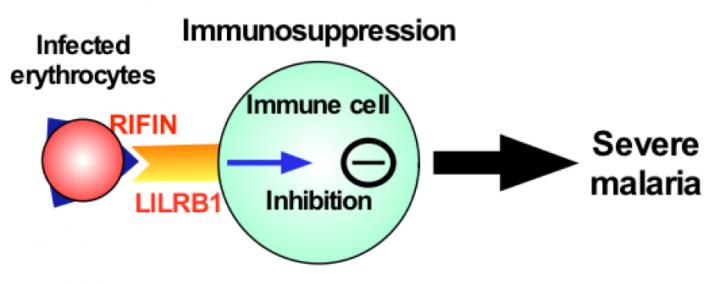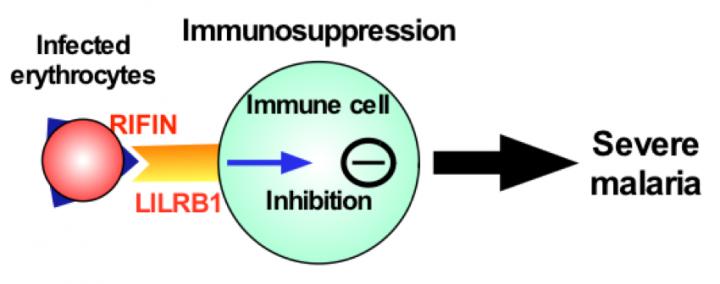
Credit: Osaka University
Malaria*1 is one of three major infectious diseases*2 affecting approximately 300 million people every year, accounting for about 500,000 deaths, but effective vaccine development has not been successful. Among malaria parasites infecting humans, Plasmodium falciparum (P. falciparum)*3 causes especially severe disease. In addition, acquired immunity to malaria is inefficient, even after repeated exposures to P. falciparum, but the immune regulatory mechanisms used by P. falciparum remain largely unclear. Therefore, malaria parasites appear to have a mechanism to escape our immune system.
A research group led by Fumiji Saito, Kouyuki Hirayasu, Hisashi Arase at Osaka University found that proteins called RIFIN expressed on erythrocytes infected with P. falciparum help the parasite to suppress the host immune response, causing severe malaria (Fig. 1). These findings are expected to contribute to the development of effective vaccines and therapeutic drugs against malaria.
Malaria parasites infect mainly erythrocytes in the host and proliferate within infected erythrocytes. The team found that proteins called RIFIN*4 expressed on P falciparum-infected erythrocytes bind to a host inhibitory receptor LILRB1*5. Furthermore, RIFIN suppresses the immune response to malaria, resulting in severe complications of malaria.
This research disclosed for the first time in the world that P. falciparum has a new mechanism to suppress the host immune response by using an inhibitory receptor, contributing to the pathogenesis of severe malaria. The results of this research are expected to greatly contribute to the development of therapeutic drug and vaccine against malaria.
###
*1 Malaria
Infectious diseases caused by malaria parasites
*2 Three major infectious diseases
Malaria, tuberculosis, and HIV/AIDS
*3 Plasmodium falciparum
Malaria parasites infecting humans, and causing the most severe complications of malaria
*4 RIFIN
RIFIN proteins are encoded by the rif (repetitive interspersed family) genes of P. falciparum. There are about 150 rif genes per parasite genome. However, their functions have been still unclear.
*5 LILRB1
One of the immune inhibitory receptors that suppress the activation of immune cells and prevent autoimmune responses by recognizing self-molecules like major histocompatibility complex (MHC) class I. Human cytomegalovirus is also known to have a viral MHC class I-like molecule (UL18) that suppresses the immune response via LILRB1 for immune escape.
Title: Immune evasion of Plasmodium falciparum by RIFIN via inhibitory receptors
Journal: Nature
DOI: 10.1038/nature24994
Authors: Fumiji Saito*, Kouyuki Hirayasu*, Takeshi Satoh, Christian W. Wang, John Lusingu, Takao Arimori, Kyoko Shida, Nirianne Marie Q. Palacpac, Sawako Itagaki, Shiroh Iwanaga, Eizo Takashima, Takafumi Tsuboi, Masako Kohyama, Tadahiro Suenaga, Marco Colonna, Junichi Takagi, Thomas Lavstsen, Toshihiro Horii, Hisashi Arase
*These authors equally contributed to this work.
Media Contact
Saori Obayashi
[email protected]
81-661-055-886
@osaka_univ_e
http://www.osaka-u.ac.jp/en
Original Source
http://resou.osaka-u.ac.jp/en/research/2017/20171130_1 http://dx.doi.org/10.1038/nature24994





